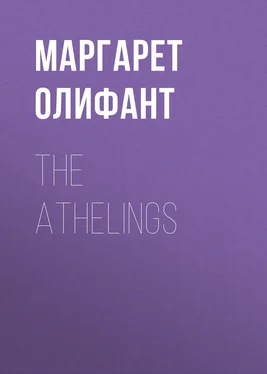Маргарет Олифант - The Athelings
Здесь есть возможность читать онлайн «Маргарет Олифант - The Athelings» — ознакомительный отрывок электронной книги совершенно бесплатно, а после прочтения отрывка купить полную версию. В некоторых случаях можно слушать аудио, скачать через торрент в формате fb2 и присутствует краткое содержание. Жанр: foreign_prose, literature_19, foreign_antique, на английском языке. Описание произведения, (предисловие) а так же отзывы посетителей доступны на портале библиотеки ЛибКат.
- Название:The Athelings
- Автор:
- Жанр:
- Год:неизвестен
- ISBN:нет данных
- Рейтинг книги:5 / 5. Голосов: 1
-
Избранное:Добавить в избранное
- Отзывы:
-
Ваша оценка:
- 100
- 1
- 2
- 3
- 4
- 5
The Athelings: краткое содержание, описание и аннотация
Предлагаем к чтению аннотацию, описание, краткое содержание или предисловие (зависит от того, что написал сам автор книги «The Athelings»). Если вы не нашли необходимую информацию о книге — напишите в комментариях, мы постараемся отыскать её.
The Athelings — читать онлайн ознакомительный отрывок
Ниже представлен текст книги, разбитый по страницам. Система сохранения места последней прочитанной страницы, позволяет с удобством читать онлайн бесплатно книгу «The Athelings», без необходимости каждый раз заново искать на чём Вы остановились. Поставьте закладку, и сможете в любой момент перейти на страницу, на которой закончили чтение.
Интервал:
Закладка:
And Mr Atheling, good man, was almost as much disturbed for the moment as his wife. At first he was incredulous—then he laughed, but the laugh was extremely unsteady in its sound—then he read over the paper with great care, steadily resisting the constant interruptions of Agnes and Marian, who persecuted him with their questions, “What do you think of it, papa?” before the excellent papa had time to think at all. Finally, Mr Atheling laughed again with more composure, and spread out upon the table the important “Memorandum of Agreement.” “Sign it, Agnes,” said Papa; “it seems all right, and quite business-like, so far as I can see. She’s not twenty-one, yet—I don’t suppose it’s legal—that child! Sign it, Agnes.”
This was by no means what Papa was expected to say; yet Agnes, with excitement, got her blotting-book and her pen. This innocent family were as anxious that Agnes’s autograph should be well written as if it had been intended for a specimen of caligraphy, instead of the signature to a legal document; nor was the young author herself less concerned; and she made sure of the pen, and steadied her hand conscientiously before she wrote that pretty “Agnes Atheling,” which put the other ugly printer-like handwriting completely to shame. And now it was done—there was a momentary pause of solemn silence, not disturbed even by Bell and Beau.
“So this is the beginning of Agnes’s fortune,” said Mr Atheling. “Now Mary, and all of you, don’t be excited; every book does not succeed because it finds a publisher; and you must not place your expectations too high; for you know Agnes knows nothing of the world.”
It was very good to say “don’t be excited,” when Mr Atheling himself was entirely oblivious of his newspaper, indifferent to his tea, and actually did not hear the familiar knock of Mr Foggo at the outer door.
“And these half profits, papa, I wonder what they will be,” said Agnes, glad to take up something tangible in this vague delight.
“Oh, something very considerable,” said Papa, forgetting his own caution. “I should not wonder if the publisher made a great deal of money by it: they know what they’re about. Get up and get me my slippers, you little rascals. When Agnes comes into her fortune, what a paradise of toys for Bell and Beau!”
But the door opened, and Mr Foggo came in like a big brown cloud. There was no concealing from him the printed paper—no hiding the overflowings of the family content. So Agnes and Marian hurried off for half an hour’s practising, and then put the twins to bed, and gossiped over the fire in the little nursery. What a pleasant night it was!
CHAPTER XVI.
FAMILY EXCITEMENT
It would be impossible to describe, after that first beginning, the pleasant interest and excitement kept up in this family concerning the fortune of Agnes. All kinds of vague and delightful magnificences floated in the minds of the two girls: guesses of prodigious sums of money and unimaginable honours were constantly hazarded by Marian; and Agnes, though she laughed at, and professed to disbelieve, these splendid imaginations, was, beyond all controversy, greatly influenced by them. The house held up its head, and began to dream of fame and greatness. Even Mr Atheling, in a trance of exalted and exulting fancy, went down self-absorbed through the busy moving streets, and scarcely noticed the steady current of the Islingtonian public setting in strong for the City. Even Mamma, going about her household business, had something visionary in her eye; she saw a long way beyond to-day’s little cares and difficulties—the grand distant lights of the future streaming down on the fair heads of her two girls. It was not possible, at least in the mother’s fancy, to separate these two who were so closely united. No one in the house, indeed, could recognise Agnes without Marian, or Marian without Agnes; and this new fortune belonged to both.
And then there followed all those indefinite but glorious adjuncts involved in this beginning of fate—society, friends, a class of people, as those good dreamers supposed, more able to understand and appreciate the simple and modest refinement of these young minds;—all the world was to be moved by this one book—everybody was to render homage—all society to be disturbed with eagerness. Mr Atheling adjured the family not to raise their expectations too high, yet raised his own to the most magnificent level of unlikely greatness. Mrs Atheling had generous compunctions of mind as she looked at the ribbons already half faded. Agnes now was in a very different position from her who made the unthrifty purchase of a colour which would not bear the sun. Mamma held a very solemn synod in her own mind, and was half resolved to buy new ones upon her own responsibility. But then there was something shabby in building upon an expectation which as yet was so indefinite. And we are glad to say there was so much sobriety and good sense in the house of the Athelings, despite their glorious anticipations, that the ribbons of Agnes and Marian, though they began to fulfil Mrs Atheling’s prediction, still steadily did their duty, and bade fair to last out their appointed time.
This was a very pleasant time to the whole household. Their position, their comfort, their external circumstances, were in no respect changed, yet everything was brightened and radiant in an overflow of hope. There was neither ill nor sickness nor sorrow to mar the enjoyment; everything at this period was going well with them, to whom many a day and many a year had gone full heavily. They were not aware themselves of their present happiness; they were all looking eagerly forward, bent upon a future which was to be so much superior to to-day, and none dreamed how little pleasure was to be got out of the realisation, in comparison with the delight they all took in the hope. They could afford so well to laugh at all their homely difficulties—to make jokes upon Mamma’s grave looks as she discovered an extravagant shilling or two in the household accounts—or found out that Susan had been wasteful in the kitchen. It was so odd, so funny , to contrast these minute cares with the golden age which was to come.
And then the plans and secret intentions, the wonderful committees which sat in profound retirement; Marian plotting with Mamma what Agnes should have when she came into her fortune, and Agnes advising, with the same infallible authority, for the advantage of Marian. The vast and ambitious project of the girls for going to the country—the country or the sea-side—some one, they did not care which, of those beautiful unknown beatific regions out of London, which were to them all fairyland and countries of magic. We suppose nobody ever did enjoy the sea breezes as Agnes and Marian Atheling, in their little white bed-chamber, enjoyed the imaginary gale upon the imaginary sands, which they could perceive brightening the cheek of Mamma, and tossing about the curls of the twin-babies, at any moment of any night or day. This was to be the grand triumph of the time when Agnes came into her fortune, though even Mamma as yet had not heard of the project; but already it was a greater pleasure to the girls than any real visit to any real sea-side in this visible earth ever could be.
And then there began to come, dropping in at all hours, from the earliest post in the morning to the last startling delivery at nine o’clock at night, packets of printed papers—the proof-sheets of this astonishing book. You are not to suppose that those proofs needed much correcting—Agnes’s manuscript was far too daintily written for that; yet every one read them with the utmost care and attention, and Papa made little crosses in pencil on the margin when he came to a doubtful word. Everybody read them, not once only, but sometimes twice, or even three times over—everybody but Charlie, who eat them up with his bread and butter at tea, did not say a word on the subject, and never looked at them again. All Bellevue resounded with the knocks of that incessant postman at Number Ten. Public opinion was divided on the subject. Some people said the Athelings had been extravagant, and were now suffering under a very Egyptian plague, a hailstorm of bills; others, more charitable, had private information that both the Miss Athelings were going to be married, and believed this continual dropping to be a carnival shower of flowers and bonbons , the love-letters of the affianced bridegrooms; but nobody supposed that the unconscious and innocent postman stood a respectable deputy for the little Beelzebub, to whose sooty hands of natural right should have been committed the custody of those fair and uncorrectable sheets. Sometimes, indeed, this sable emissary made a hasty and half-visible appearance in his own proper person, with one startling knock, as loud, but more solemn than the postman—“That’s the Devil!” said Charlie, with unexpected animation, the second time this emphatic sound was heard; and Susan refused point-blank to open the door.
Читать дальшеИнтервал:
Закладка:
Похожие книги на «The Athelings»
Представляем Вашему вниманию похожие книги на «The Athelings» списком для выбора. Мы отобрали схожую по названию и смыслу литературу в надежде предоставить читателям больше вариантов отыскать новые, интересные, ещё непрочитанные произведения.
Обсуждение, отзывы о книге «The Athelings» и просто собственные мнения читателей. Оставьте ваши комментарии, напишите, что Вы думаете о произведении, его смысле или главных героях. Укажите что конкретно понравилось, а что нет, и почему Вы так считаете.












